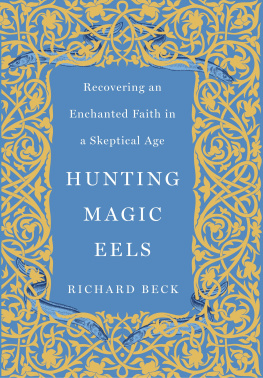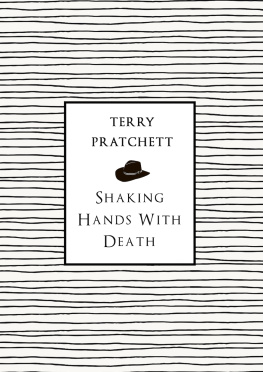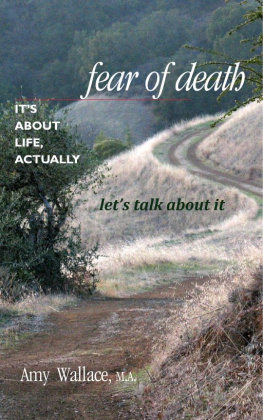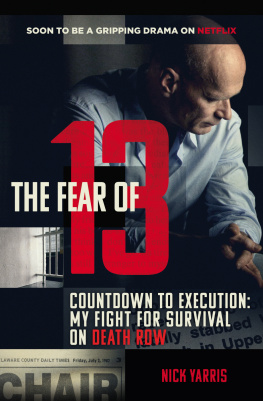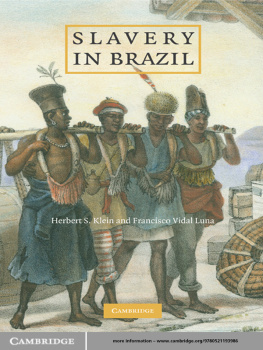The Slavery of Death
Copyright 2014 Richard Beck. All rights reserved. Except for brief quotations in critical publications or reviews, no part of this book may be reproduced in any manner without prior written permission from the publisher. Write: Permissions. Wipf and Stock Publishers, W. th Ave., Suite , Eugene, OR 97401 .
Cascade Books
An Imprint of Wipf and Stock Publishers
W. th Ave., Suite
Eugene, OR 97401
www.wipfandstock.com
ISBN : 978-1-62032-777-7
EISBN 13: 978-1-63087-099-7
Cataloguing-in-Publication Data
Beck, Richard Allen, 1967
The slavery of death / Richard Beck.
xiv + p. ; cm. Includes bibliographical references.
ISBN 13: 978-1-62032-777-7
Death. I. Title.
BD444 .B435 2014
Manufactured in the U.S.A.
Scripture quotations marked (NIV) are taken from the Holy Bible, New International Version, NIV. Copyright 1973, 1978, 1984, 2011 by Biblica, Inc. Used by permission of Zondervan. All rights reserved worldwide. www.zondervan.com The NIV and New International Version are trademarks registered in the United States Patent and Trademark Office by Biblica, Inc.
Scripture quotations marked (GNB) are taken from the Good News Bible 1994 published by the Bible Societies/HarperCollins Publishers Ltd UK, Good News Bible American Bible Society 1966, 1971, 1976, 1992. Used with permission.
For Mom and Dad
Since the children have flesh and blood, he too shared in their humanity so that by his death he might break the power of him who holds the power of deaththat is, the deviland free those who all their lives were held in slavery by their fear of death.
Hebrews :
The way of Jesus is the way of self-expenditure.
Arthur McGill
Look at your poverty
welcome it
cherish it
dont be afraid
share your death
because thus you will share your love and your life.
Jean Vanier
Prelude
The Sting of Death
.
T he sting of death is sin.
So wrote the Apostle Paul in the first letter to the Corinthians. Its a curious formulation if you ponder it, particularly if you come from a Protestant tradition. As Protestants we tend to think that sin is our primary predicament, the reason Jesus Christ died at Golgothahis death an atoning sacrifice for our sins. But in his words to the Corinthians Paul seems to suggest that sin is a consequence of death. If so, death might be our deeper, more significant problem. Sin might be less the disease than a symptom . Death, in this view, is the cause of sin.
This is a peculiar reversal for many Protestants who have tended to think that death is the consequence of sin. Its sin that causes death, not the other way around. The impulse here is less the sting of death is sin than the refrain from Romans :The wages of sin is death. And such an understanding is supported by the story in Genesis where, after the primal sin, Adam and Eve are expelled from Eden and separated from the Tree of Life. Romans :: Therefore, just as sin entered the world through one man, and death through sin, and in this way death came to all people, because all sinned. The sin of Adam and Eve, a sin we recapitulate, brings death into the worldboth physical death (mortality) and spiritual death (separation from God).
And yet, there are many passages within the New Testament that place death at the center of the human predicament. For example, it is death, rather than sin, that is considered to be the last enemy ( Cor :). In the book of Revelation the last thing to be thrown into the Lake of Fire is death and Hades. And at the end of Romans , Pauls long discussion of his experience in wrestling with sin, he concludes with a peculiar cry: What a wretched man I am! Who will rescue me from this body that is subject to death? The root of Pauls sin problem seems to be that he has, just like the rest of us, a body that is subject to death.
Another facet of this perspective worth noting is how the Bible describes the activity of the devil. Throughout the New Testament sin, death, and the devil are at times described as almost interchangeable forces, three facets of an ontological unitya sort of unholy Trinity. Consequently, if we are to have a full biblical understanding concerning the work of Jesusthe work he accomplished in his life, death, and resurrectionwe must pay attention to texts like John :: The reason the Son of God appeared was to destroy the devils work. What is this work of the devil? And how was it destroyed? Most Protestants tend to reduce the role of Satan to that of tempter, and undeniably that is a part of the picture. But the New Testament also describes Satan as holding the power of death. As it says in Hebrews :, the death of Jesus was intended to destroy him who holds the power of deaththat is, the devil. This victory over the devil is reaffirmed in the opening vision of Revelation where the Resurrected Lord is declared to be holding the keys of death and Hades. Death, once under the power of Satan, is now under the power of Christ.
While this focus on the devil might seem strange to many modern Christians, particularly liberal Christians, this material in the New Testament continues to highlight the centrality of death in the human predicament. Death is seen as the power of the devil in our lives. And one reasonperhaps even the primary reasonfor Christs death on the cross was to rob the devil of this power. The reason Christ appeared was to free those who, in the words of Hebrews :, were all their lives enslaved to the fear of death.
.
This book will work with a reversal of the traditional Protestant understanding regarding the causal association between sin and death. The traditional understanding:
Protestant Formulation:
Sin causes Death.
Biblical articulation: The wages of sin is death (Rom : ).
The frame we will be focusing on reverses this association. This is an understanding that has been largely marginalized within the Protestant tradition. However, as we will see, this understanding was common in the first centuries of the church and it continues to inform the Eastern Orthodox church:
Orthodox Formulation:
Death causes Sin.
Biblical articulation: The sting of death is sin ( Cor : ).
Looking at both formulations, what we find is a complex causal tangle, even before we throw the devil into the mix. So to be clear, the perspective of this book, which emphasizes the moral impact of death upon our lives, isnt an attempt to replace the Protestant framing. Rather, the goal is to point out how the Protestant tradition, in placing the primary emphasis upon sin, has ignored a wealth of biblical material regarding the nature of sin and salvation. The Bible presents us with a dense and complex causal matrix in which sin, death, and the devil all mutually interact. Consequently, an exclusive focus on sin tends to oversimplify the dynamics of our moral struggles. I argue that a fuller analysis is critical as it will present us with a clearer picture of Christian virtuelove in particular. By exposing the dynamics of the devils work in our lives, works produced by a slavery to the fear of death, we will be better positioned to resist the satanic influences in our lives, better equipped to do battle with the principalities and powers of darkness, and better able to love as Christ loved us.
.
As noted above, while treating death as our primary predicament may seem strange to some, this perspective is the norm within the Eastern Orthodox tradition. Thus much of this book (particularly Part ) will mine the riches of the Orthodox tradition, which brings us to a question: If a great deal of the theological material included can be found within the Orthodox tradition, why should one choose to read a book written by a Protestant psychologist?


